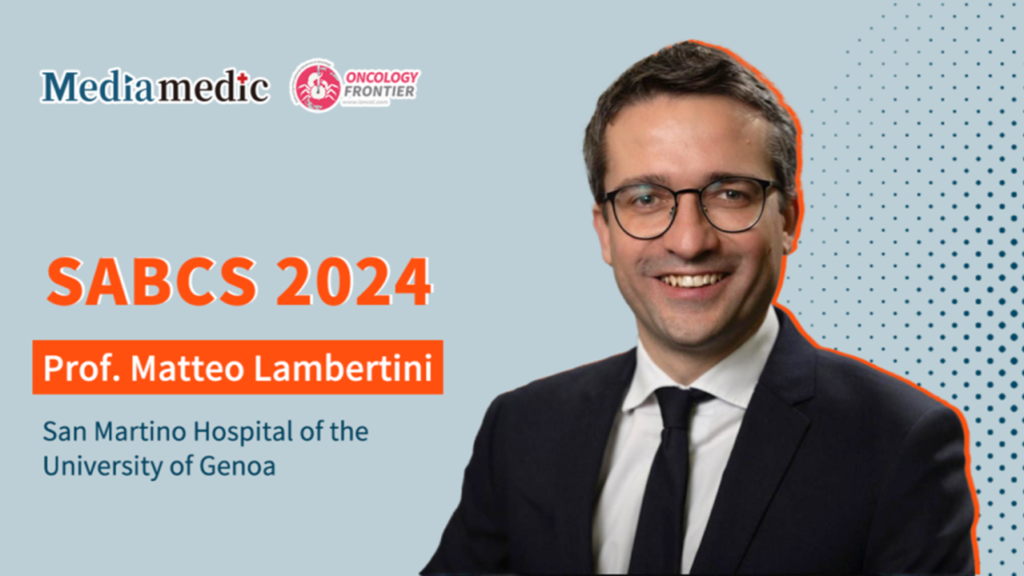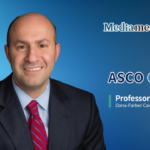
Editor's Note: In the field of breast cancer, the treatment of patients with BRCA gene mutations has always been a research hotspot. Recently, at the SABCS conference, Professor Matteo Lambertini from the San Martino Hospital of the University of Genoa, Italy, shared the latest findings on the treatment of BRCA-mutated breast cancer in depth (abstract number: GS1-08). This study aims to explore the impact of risk-reducing surgeries (including prophylactic mastectomy and prophylactic salpingo-oophorectomy) on the survival outcomes of young patients with BRCA-mutated breast cancer. The researchers collected and analyzed data from 5,290 young patients with BRCA-mutated breast cancer from 109 centers worldwide, providing important evidence for the cancer risk management strategies of this specific patient population. Oncology Frontier interviewed Professor Matteo Lambertini on-site at the SABCS conference and invited him to share the highlights of the conference that he focused on.Oncology Frontier:Could you please briefly introduce yourself as well as your field and research direction.
Professor Matteo Lambertini:Hello, everyone. My name is Matteo Lambertini. I’m a medical oncologist and associate professor in medical oncology at the University of Genoa, San Martino Hospital in Genoa, Italy.
Oncology Frontier:Could you please briefly introduce the research you presented during this meeting?
Professor Matteo Lambertini:At the San Antonio Breast Cancer Symposium 2024, we have presented the results of a large international core study that included more than 5,200 patients with diagnosis of breast cancer at a young age, so 40 years or less. And all of them were known to carry a germline BRCA pathogenic variant in the BRCA genes. So they were young BRCA carriers with diagnosis of breast cancer. And in this specific analysis, we focused on the role of risk-reducing surgeries, and specifically we looked into the association between risk-reducing surgeries and survival outcomes. And the main results of this analysis have been that both risk-reducing mastectomy as well as risk-reducing salpingophorectomy were associated with significant improvement in overall survival(OS), disease-free survival(DFS), and breast cancer-free interval(BCFI), with a major advantage that was observed in all the patient subgroups. But these are data, again, that should be considered for a special patient population, so those women that are BRCA carriers and have been already diagnosed with breast cancer at a young age.
Oncology Frontier:And in the field of your expertise, what are the significance of the advancement and the groundbreaking research presented at this conference that deserve attention?
Professor Matteo Lambertini:At the San Antonio Breast Cancer Symposium, we have had a lot of important trials presented in the breast cancer field. During the first day general session, we had a publication in the New England Journal of Medicine of the results of the EMBER-3 trial investigated an oral SERD called Imlunestrant in the management of patients with Hormone receptor-positive , HER2 negative, advanced breast cancer with endocrine-resistant disease. And in this trial, the authors have investigated the benefit of this SERD single-agent or in combination with abemaciclib as compared to standard single-agent endocrine therapy, so fulvestrant or aromatase inhibitors. This ended in The New England publication, so very important data that can be practice-changing.
But this conference is also very much appreciated because it’s a very multidisciplinary event in which we have news not only in the medical oncology field, but also in other fields, including surgery, including radiotherapy, as well as survivorship. So many, many news to be followed at the San Antonio Breast Cancer Symposium.
Oncology Frontier:So are there any valuable insights that you gained from this conference that you can share with our audience? And how will those insights influence your clinical practice or future research directions?
Professor Matteo Lambertini:Yeah, based on the data presented at the San Antonio Breast Cancer Symposium, we say that the critical word is optimization, treatment optimization. So trying to improve the way we care about our patients with breast cancer in terms of trying to reduce the burden of treatment when not so much treatment is needed. And on the other side, to escalate the treatments to doing something more for those women that require more treatment. There has been a lot of presentation at the conference on studies in these two directions. So escalation or de-escalation of local treatment as well as systemic therapies that will definitely help us improve in the way we care about our patients with breast cancer and so to optimize the treatment of our patients.


